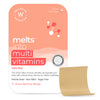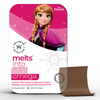In ancient times, people thrived on a diet rich in fruits, herbs, and a well-balanced thaali. However, the modern, fast-paced lifestyle often leaves a nutritional gap. Despite our best efforts, our daily diet might only cover part of the spectrum of essential nutrients. So, what do we get from our current diet? Definitely not 100% nutrition, but at least 70% of it. Where do we get the rest of the 30% from? This is where natural supplements come into play, ensuring we meet our body's nutritional needs. But are all supplements created equal? In exploring the supplement landscape, we'll delve into the must-haves and the ones you can pass on.
Essential vitamins and minerals
While macronutrients like carbohydrates, proteins, and lipids are abundant in various diets, micronutrients like vitamins and minerals are essential and require more attention. Essential micronutrients include vitamins like A, B-Complex, C, D, E, and K, minerals including major elements like calcium, sodium, and potassium, and trace elements like copper, iodine, and zinc.
1. Magical Multivitamins!
A wholesome diet provides all essential micronutrients, but busy lifestyles often fall short. Here come multivitamins to save our day, encapsulating all the significant micronutrients, including trace elements, in concentrated amounts. They can be capsules, tablets, gummies, or even melt strips in form [1].
Multivitamins from Wellbeing Nutrition are well-categorised and designed for all age groups and nutritional needs. melts® Multivitamins are an all too easy and convenient form of consuming all nutrients in a straightforward go!
2. Vital omega 3 [4]
Studies show the importance of omega-3 for cardiovascular and brain health.
- It transfers cholesterol from body tissues to the liver to expel it out of the body.
- It helps in providing the lipids essential for nerve function and neuronal protection.
- It is required for the protection and functioning of cellular membranes
- It plays a vital role in modulating the immune system
Omega 3 provides amazing benefits to the skin, including hydration, dermal immunity, and elasticity.
Who should take Omega 3?
Although it is mostly safe to consume, people suffering from cardiovascular or inflammatory conditions should specifically consume omega-3 supplements.
Who should not take Omega 3?
If you are on pharmaceutical drug prescriptions, omega-3 can interfere with the medications.
Since, Omega 3 is vital for overall health, we have incorporated it in an intelligent time-release capsule. Virgin Omega 3 covers all health needs, including bone and joints, heart and brain, skin and vision. It has your back!
3. Iron control on health! [6]
Iron is an element from natural food sources such as leafy vegetables, beans, lentils, nuts, meat, and seafood. Fortified foods also include iron. It has some vital functions to perform:
- It is crucial for blood formation, specifically hemoglobin
- It is required for oxygen transport
- Transport of other molecules via transferrin hence acts as a vehicle
Who should take iron supplements?
- Pregnant, breastfeeding, and menstruating women,
- Individuals with cardiovascular or gastrointestinal disorders
Who should not take iron supplements?
People with a rich leafy regular diet, antacid medications, or calcium supplements, since it interferes with iron absorption.
melts® Vital Iron is a strip designed to deliver a potent dose of iron and combat iron deficiency symptoms.
4.Vigour of Vitamin B12!
Vitamin B12, known as cyanocobalamin, is a water-soluble vitamin generally found in poultry, fish, meat, eggs, milk, and dairy products. Cereals and nutritional yeasts are fortified with vitamin B12.
- Vitamin B12 helps in keeping blood cells and nerve cells healthy. It also helps in preventing megaloblastic anemia.
- It helps in the formation and regulation of DNA.
- It supports the proper functioning of the brain, and nerve cells and prevents congenital disorders.
Consequently, deficiency or loss of vitamin B12 leads to low oxygen transport to blood and tissue, leading to symptoms such as weak muscles, fatigue, numbness, fluctuation of blood pressure, nausea, weight loss, etc. [8].
Who should take B12 Supplements?
Vegetarians, people suffering from disorders of small intestines or celiac diseases.
Who should not take B12?
People with sensitivities or allergies towards vitamin B12 or cobalt.
We have your back, guys! melts® vegan vitamin B12 is a plant-based folate strip to counter vitamin B12 deficiency and promote cognitive health. Other than this, we have various Vitamin B12 products to boost.
5. Vitamin D3: the real Sun Expert!
Vitamin D3 is a fat-soluble vitamin D that helps absorption of calcium and phosphorus. A drop in vitamin D means a drop in calcium and phosphorus, leading to osteoporosis and bone disorders. It is indeed a domino effect here. It is also essential for the growth of hair follicles and skin metabolism.
We already know that sunlight is the source of vitamin D. However, it is not the sunlight that provides vitamin D directly. It is present in the body in pre-active form, which converts into active form after sunlight starts the reaction. A walk in the morning sun sounds excellent now.
Who should take vitamin D3?
- People who have osteoporosis, i.e., weak and brittle bones
- People suffering from plaque-induced psoriasis
- Postmenopausal women suffering from loss of bone density
- Expecting and breastfeeding women to meet daily nutritional requirements
Who should not take vitamin D3:
People with high calcium levels in the body or an allergic reaction to vitamin D3 should not consume D3 supplements. We do not want a calcium overload or allergic sneezes, right?
melts® Natural Vitamin D3 is India’s first 100% vegan vitamin strip designed to counter deficiency, promote strong bones, and boost immunity. Other products containing vitamin D3 include a range of multivitamins.
Wrapping Up!
While natural supplements bridge nutritional gaps, assessing individual needs, dosage, and timings is crucial. Seeking professional advice, especially for pregnant or lactating women, ensures a personalized approach to supplementation. Choosing the right supplements is paramount. The array of products from Wellbeing Nutrition, each tailored to specific needs, provides a comprehensive and convenient solution. Your health is an investment; with the right supplements, your body gets thriving results!
References:
- https://www.hsph.harvard.edu/nutritionsource/vitamins/
- https://wellbeingnutrition.com/pages/catalog-search-results?q=multivitamins
- https://wellbeingnutrition.com/pages/catalog-search-results?q=melts%20multivitamin
- https://www.chhs.colostate.edu/krnc/monthly-blog/importance-of-omega-3-fatty-acids/#:~:text=Omega%2D3s%20are%20a%20specific,a%20macronutrient%20we%20all%20need.
- https://wellbeingnutrition.com/products/slow-triple-strength-omega-3
- https://ods.od.nih.gov/factsheets/Iron-Consumer/#:~:text=Iron%20is%20a%20mineral%20that,iron%20to%20make%20some%20hormones.
- https://wellbeingnutrition.com/products/melts-vital-iron-oral-strips
- https://www.hopkinsmedicine.org/health/conditions-and-diseases/vitamin-b12-deficiency-anemia#:~:text=Key%20points%20about%20vitamin%20B12%20deficiency%20anemia&text=of%20megaloblastic%20anemia.-,Without%20enough%20red%20blood%20cells%2C%20your%20tissues%20and%20organs%20don,fatigue%2C%20and%20increased%20heart%20rate.
- https://wellbeingnutrition.com/products/melts-vitamin-b12-1500mcg-folate-brahmi-curcumin-oral-strips
- https://wellbeingnutrition.com/pages/catalog-search-results?q=vitamin%20B12
- https://wellbeingnutrition.com/products/melts-plant-based-d3k2-oral-strips
- https://wellbeingnutrition.com/pages/catalog-search-results?q=vitamin%20D3





























 DOWNLOAD NOW
DOWNLOAD NOW
